#Delphi medics
Explore tagged Tumblr posts
Text

lovely and warm- just what the patients needed!
Based on this ,, book cover? I think

#transformers#maccadams#mtmte#transformers idw#transformers mtmte#first aid idw#pharma#pharma idw#first aid#pharmaid#delphi medics#this would cure me actually
114 notes
·
View notes
Text

Hello! I'm doing a leftover sale of my old merch! You can check it out on my Ko-Fi!
Enjoy!
#my art#maccadam#rescue bots#transformers#dinluke#obikin#armorkatan#mtmte#rodimus#idw#transformer#arcee#delphi medics#pharma#first aid#ambulon#thunderclash
97 notes
·
View notes
Text
Pharma…. Delphi medics… thinking… thinking…
Edit - DONE!!
15 notes
·
View notes
Text
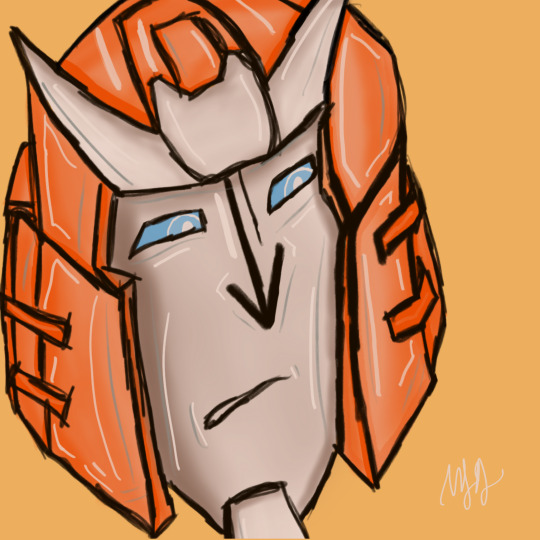
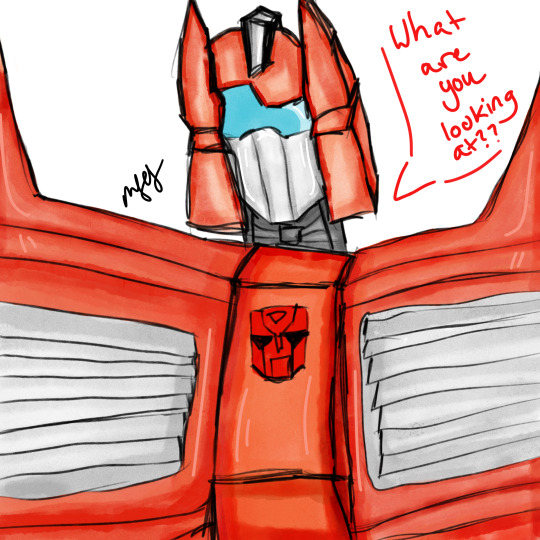

Art dump. Take my Delphi medics *throws them at you*.
Been testing some new brushes and trying to hone my style. I also came up with an idea for what to do next and I literally could not sleep all night because I was excited. Details on that will be in my next post.
Also first aid has big buzungas.
#ambulon#tf idw#transformers#tf mtmte#transformers mtmte#fanart#mtmte#lost light#idw lost light#idw transformers#idw ambulon#idw pharma#idw first aid#Delphi medics#transformers first aid#transformers pharma#transformers Ambulon#i’m too tired to tag#art dump
9 notes
·
View notes
Text
gonna move some things from my other blog to this one

based on that one post.....
#// my art#sharing from my rp blog#pharma transformers#transformers mtmte#first aid transformers#delphi medics
739 notes
·
View notes
Text
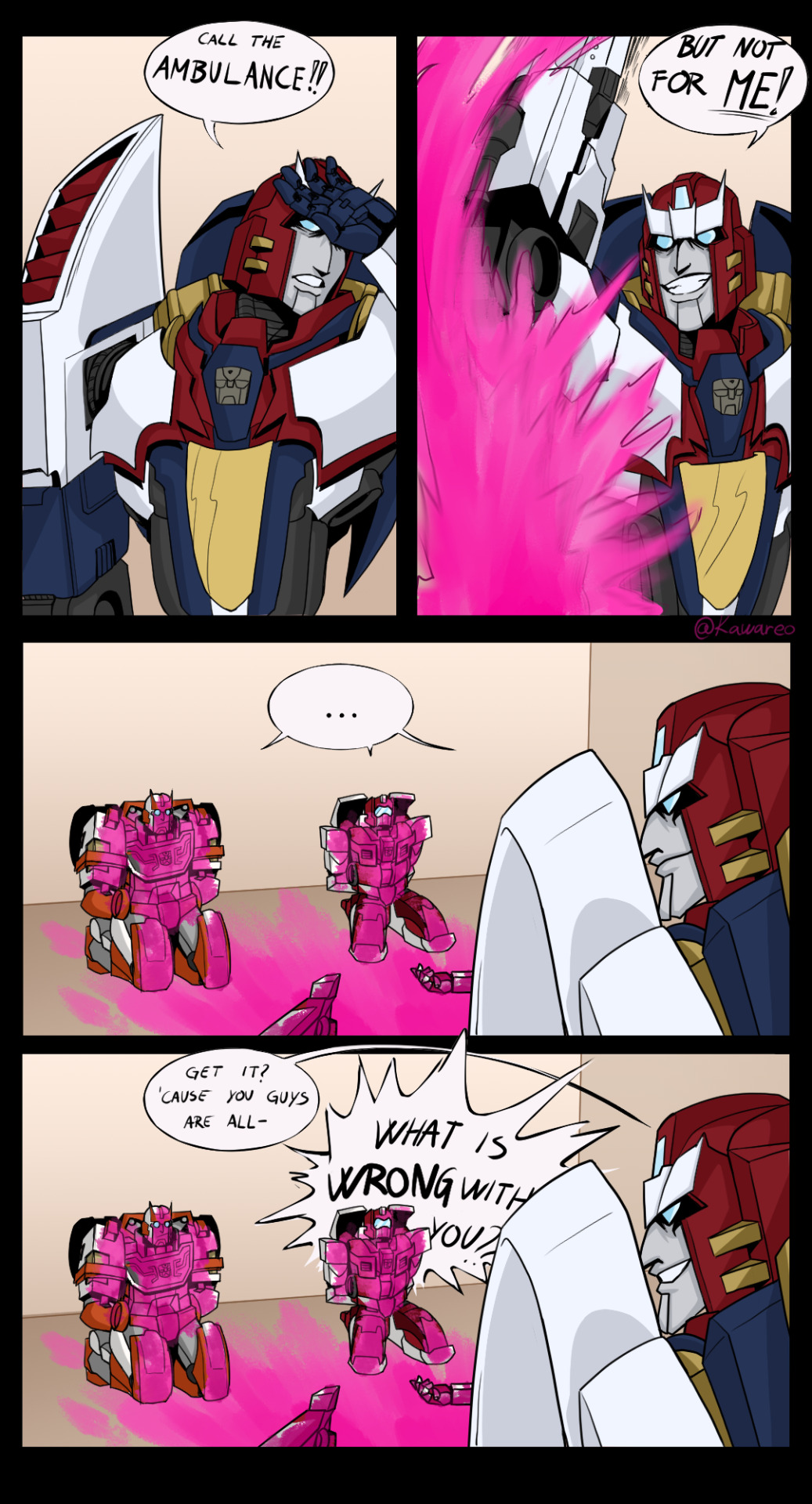
The Ambulonce
#this joke is so shitty im terribly sorry#idw#mtmte#transformers#fanart#idw pharma#idw ratchet#idw ambulon#idw first aid#idw medics#comic#pharma#ratchet#first aid#ambulon#mtmte delphi#cw: robogore
3K notes
·
View notes
Note
Fun fact! Cats purring can actually have physical health benefits. what if medics can do that by revving their engines
OMG YES 100% this immediately made me think of Ratchet and Optimus btw (especially if it's one of Optimus's many near death experiences)
But also!! May I introduce medic!Megatron into this
#maccadam#transformers#ratchet#Optimus prime#Megatron#long nights in Delphi with worried medics purring by their patients' bedside_ doing anything to will them through pulling through#opportunities 💖#ALSO A FUN OPPORTUNITY FOR HUMAN AND CYBERTRONIAN INTERACTIONS HERE
58 notes
·
View notes
Text
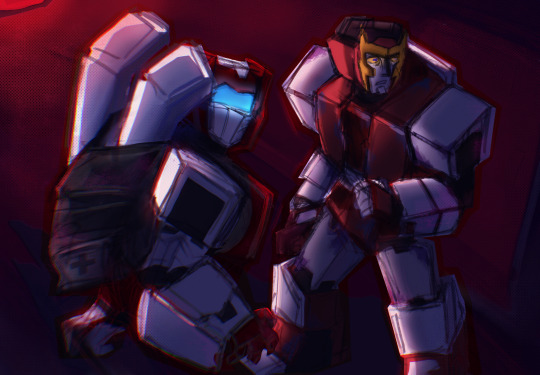
Like zoinks scoob
This was supposed to be a little doodle but it got outta hand..
#wow 2025..#ignore the giant backpack okay it’s for au purposes..#click for better quality#I heart the delphi medics#it’s giving flee the facility lowkey..#transformers#first aid#ambulon#mtmte#mtmte first aid#transformers idw#my art#THE QUALITY IS DOOKIE TUMBLR WHYYYY#can you tell I’m nervous posting this lmao
90 notes
·
View notes
Text
Revisiting this now that I know more, because I can’t help wondering about what was really going on at Delphi and whether it was just what it seems or whether there’s more to it than that.
The timeline as far as I understand it:
Delphi is constructed
Pharma is assigned there (I'm assuming this happens first)
First aid joins
Ambulon joins
Sometime later Springer recruits Aid to look for messages from agent 113 in autobot badges (source: Bullets)
LSoTW
Agent 113 discovered
Records of patient deaths increasing begin 2 years prior to start of MTMTE (MTMTE #4)
First Aid demoted (flashback shown in MTMTE #4, but exact timing unclear)
MTMTE #4-5
Everything from here on out is purely speculation on my part based on the information above.
It seems reasonable that to set up an operation like agent 113's infiltration of the DJD is something that would take a considerable amount of time and resources. And it's known that First Aid was later recruited and became directly involved in that operation. Also, Pharma was directly recruited/assigned to Delphi by Prowl (MTMTE #40) who managed covert operations for the autobots. Considering all this, it then seems possible that Delphi's unusual design was indeed because it was never intended to be just a medical base or mining outpost, but to be a station within the DJD's territory that could support agent 113's activities if needed. Further, there is no clear explanation within MTMTE for why exactly Tarn takes an interest in Delphi. However, if the time that Tarn first took an interest in the facility is around the same time as the start of the death logs First Aid broadcasts, then this would be somewhere around the same time that agent 113 is implied to be discovered. And therefore, that Tarn started looking around Delphi at that specific time because an autobot traitor had just been found within the DJD and the autobot base conspicuously on DJD territory would suddenly be a lot more interesting for the potential it had to be connected to the traitor within the DJD.
Other Thoughts:
In addition to First Aid being directly contacted by Springer (and therefore by extension the Wreckers), Pharma is shown in flashbacks to have worked around the Wreckers (SotW) and with the new institute (MTMTE #14). All of which could make sense in relation to a facility that might be used covertly, as opposed to assigning an unknown medic or someone like Ratchet to that position.
There's also a potential explanation for Ambulon's presence in this scenario beyond just hoping that he'd be overlooked. Because why have a Decepticon defector stationed in close proximity to the group infamous for hunting down Decepticon traitors? Maybe for the same reason that Shockwave was travelling around with a ship full of others that were on the list (Lost Light #14). Maybe because the hope was that if Tarn did look at Delphi, he would see Ambulon and not see anything else that might be going on.
I've been reading through MTMTE for the first time and I just went back to issue #5 and it caught my attention that Pharma, after his involvement with the red rust is discovered, disappears into a fake floor below one of the cryogenic regeneration (C.R.) chambers. Initially, I hadn't thought much of this, but really, why would there be a false room (seemingly with rooftop access as well) built into a medical base? And how did it get there?
So far I've thought of the following possible explanations:
Delphi was constructed as more than just a medical station and considering it's strategic positioning within DJD territory, this secret area was constructed to support the possibility of more covert operations.
Pharma created the space or disguised an existing area of the base to be harder to find and access in order to hide his dealings with Tarn. However, if this was the case, why then would he have stated that he "intended to hide in a C.R. chamber, but they were all occupied" when explaining his choice of the quarantine room for soundproofing? Because if he created the secret space under the C.R. chamber surely he could have soundproofed it and hidden there? Unless the point was to be able to be found somewhere more public to increase the plausible deniability that Pharma was in any way involved with the events shutting down Delphi (in which case, the room full of what appears to be t-cogs for the DJD would obviously not be an option).
#maccadam#mtmte#idw transformers#tf pharma#tf first aid#ambulon#tf ambulon#tf prowl#idw prowl#tarn#tf tarn#delphi medics#mysteries of delphi#tf delphi#agent 113#aelyxiae thoughts
11 notes
·
View notes
Text
My throat is so raw from coughing that I can't ingest anything but water and cough syrup. And even those don't go down easily. So wish me luck, I'm going to see my doctor today with the hope that she can do something about it.
5 notes
·
View notes
Text

The kind of stuff I'm looking into and writing about rn for the short Delphi story. ([Not my art] - Exploring Our Fluid Earth - Nematocysts diagram) My notes on what I remember about nematocysts.
#note#inspo#Delphi#snow planet#biology#biomimicry#research#designs#cells#cell structures#medical info#information#fic writing#diagram#diagrams#figures
3 notes
·
View notes
Text
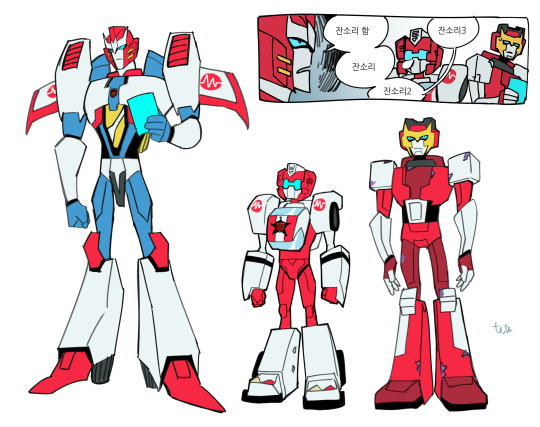
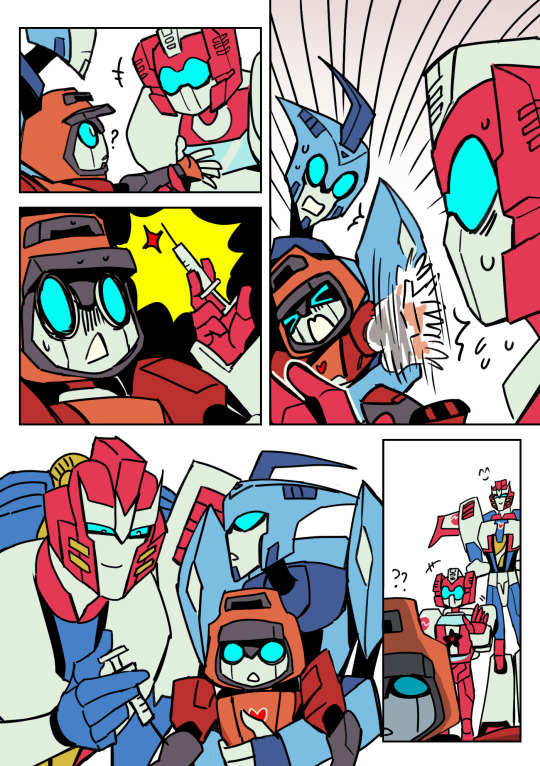
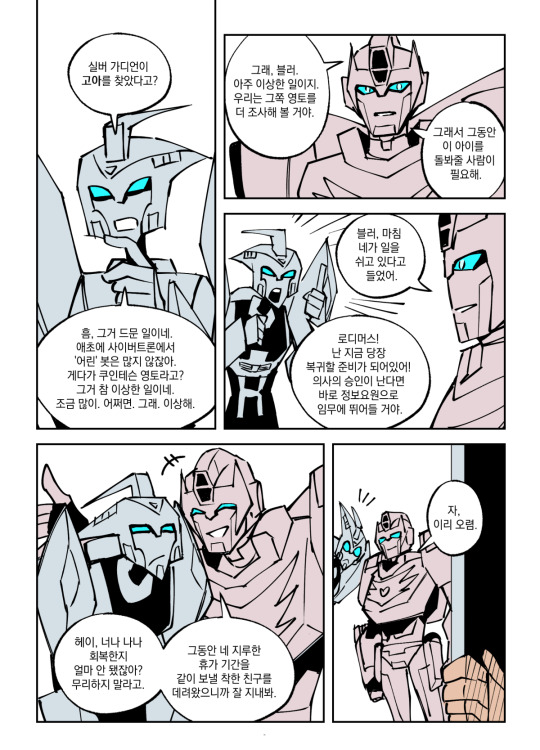

These are short cartoons about Blur taking care of Wheelie. I really want to see the medical staff in Delphi.
1K notes
·
View notes
Text

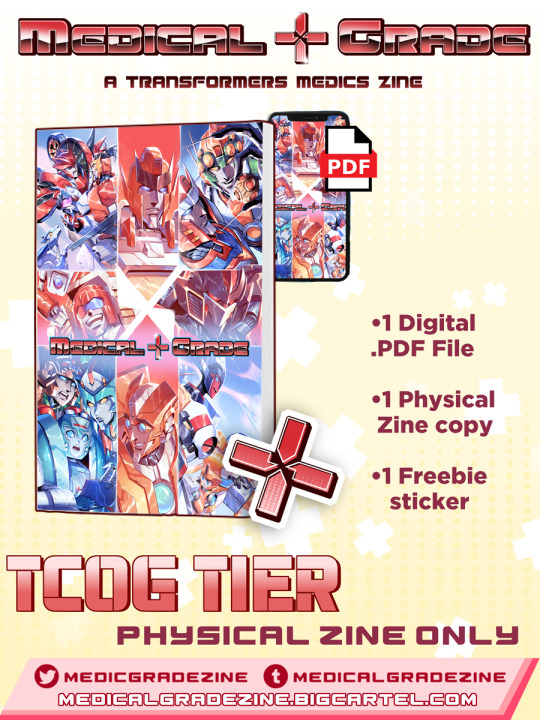
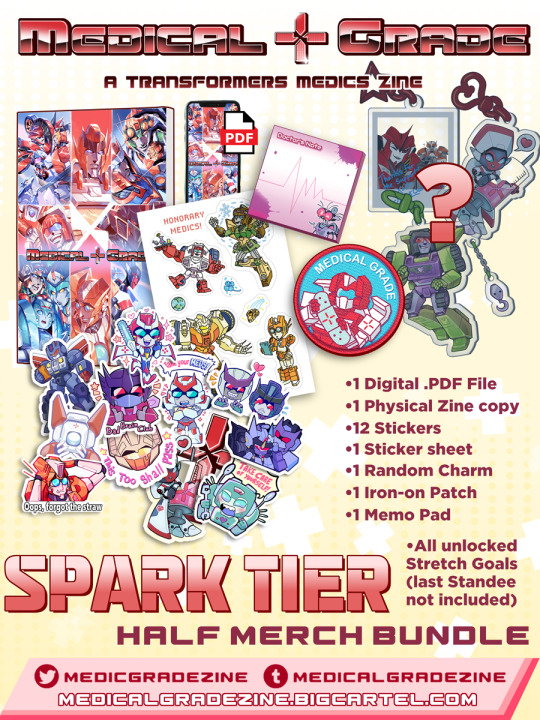

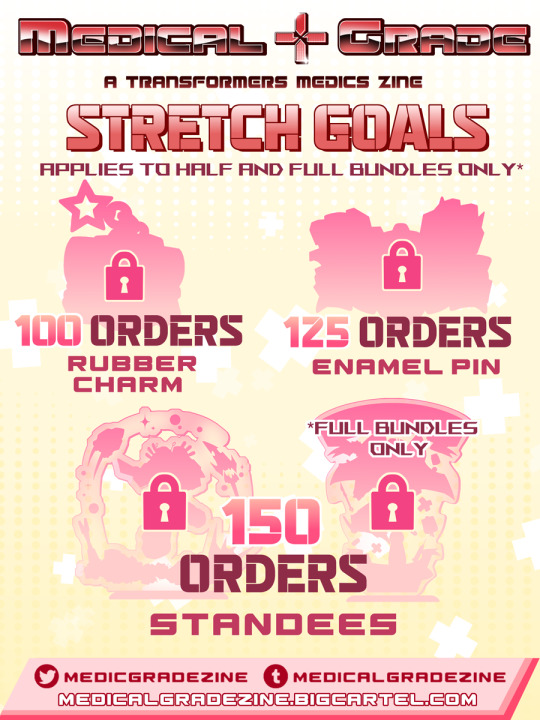
PRE-ORDERS ARE NOW LIVE!🚑
Pre-orders will run from Oct 2 til Nov 25!
🛒https://medicalgradezine.bigcartel.com
Here are all the options available for buying the Medical Grade Zine! All profits will be donated to Doctors Without Borders.
There are also three stretch goals for merch for the zine!
100 orders - Swerve Rubber Charm 125 orders - Delphi Medics Enamel Pin 150 orders - Nickel and Pharma standees* *Note that the Pharma standee will ONLY be available for Full Bundles. All other stretch goals will be in both half AND full bundles!
788 notes
·
View notes
Text
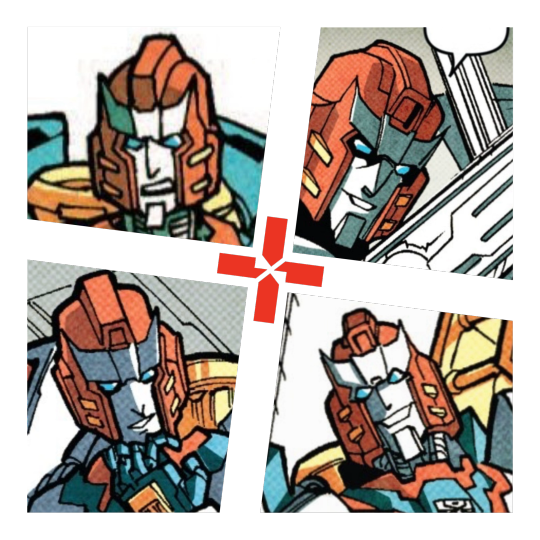
Medic, Maverick, Maniac, Murderer: Understanding Pharma
First thing’s first: I love Pharma, dearly.
In all the time I’ve spent evaluating his character, I’ve mainly focused on what can be worked out about who he is as an individual: his core sense of self, psychological drives, subjective worldview, etc.
When all else is stripped away, who is Pharma?
This treatise is the product of obsessing over Pharma, analyzing canon (and extras), and reading as many different perspectives on his character from fans across the fandom as I could find. The post is long, so for those of you who balk at the thought of reading a shortfic’s worth of Pharma thoughts, feel free to read the TL;DR (Conclusion) at the end and then decide if the full read is worth your time. Also, a premium reading experience is available in the form of the original Google Doc version.
As you read, keep in mind that this is primarily a mix of psychoanalysis, evidence-based examination, and speculation—not moral, ethical, or sociological commentary. The goal is to examine Pharma’s psychological drives and core values, and each of his appearances in the context of those. All other types of evaluation are up to readers.
Now, take your victim blaming-allergy meds (just in case); remove your black-and-white thinking caps; and leave your personal morality lenses at the door.
Psychological Drives & Core Values
Why does Pharma act the way he does? What gives him a reason to keep living? What are his personal priorities?
At the beginning of the Delphi arc, First Aid establishes Pharma as a “control freak” and someone who “thinks he’s an expert on everything.”

Now, First Aid has a habit of complaining about his bosses, but on both points, there’s canon evidence to back them both.
Expertise and Intellect
Throughout the Delphi and Luna 1 arcs, it’s established that Pharma is a skilled and brilliant doctor.
He once performed a 4-way fuel pump transplant, donating his own fuel pump in the process. (see above panel)
Later, he invented a soundbomb that left an echo laced with a virus and invented an antidote to that virus:
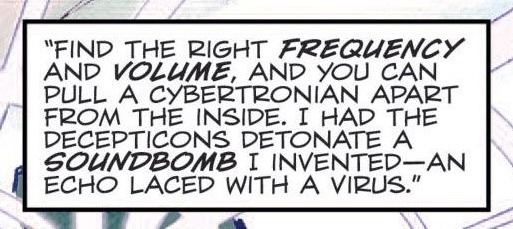
And on Luna 1, he was on the edge of finding a cure for Cybercrosis, based on the fact that Swerve was able to formulate a cure from his notes.
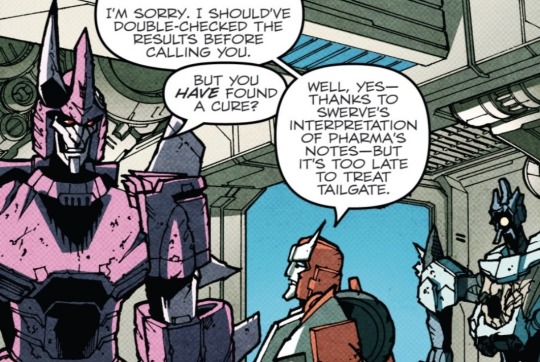
More than being a doctor, Pharma lives for intellectual and scientific achievement as a physician scientist. He feels most alive when he’s able to solve complex medical problems, and when his achievements are recognized by those whose opinion he considers important.
This is Pharma’s 'why.'
And even though he’s arrogant and enjoys praise, it’s not his primary motivation. He doesn’t need it in order to set his mind to whatever he’s interested in, although he’ll seek it from those he values most (i.e. Ratchet).
Pharma sees himself as less of a doctor, and more as a scientific innovator or medical maverick. The practice of medicine is primarily a catalyst for his creativity and intellect; it’s not an end in and of itself like it is for someone like Ratchet or First Aid.
First Aid’s observation of Pharma can be better phrased as, “[Pharma] thinks he’s an expert on everything medical”—because he’s not so driven by achievement and admiration that he’ll grovel at the feet of strangers and get good at something he doesn’t personally find interesting. The only time we see him express a desire for praise is when he’s around Ratchet—someone he holds in high regard for both personal and professional reasons. This makes sense since Ratchet is one of the only people who can give Pharma any kind of competition within what he considers to be his area of expertise.
“Each day we go to our work in the hope of discovering—in the hope that some one, no matter who, may find a solution of one of the pending great problems—and each succeeding day we return to our task with renewed ardor; and even if we are unsuccessful, our work has not been in vain, for in these strivings, in these efforts, we have found hours of untold pleasure, and we have directed our energies to the benefit of mankind.” —Nikola Tesla
Ego
Without question, Pharma has an inflated ego, but having an inflated sense of self doesn’t automatically mean a person is a full-blown narcissist or that they are totally uncaring.
Every personality trait exists on a spectrum. Yes, Pharma is arrogant, but the presence of arrogance doesn’t automatically and completely cancel out all “positive” traits. (For fun, check out studies on Dark Tetrad and Light Triad personality traits.)
People are complex. Arrogance can coexist with genuine kindness, ruthlessness can coexist with deep compassion, etc.
Whether Pharma exhibits genuine kindness is up to each reader’s interpretation of what little canon material exists, but the point is: Pharma’s arrogance doesn’t automatically rule out the possibility of authentic “positive” traits.
Controlling Tendencies
Pharma is comfortable pulling the power card and using it to dump what he sees as uninteresting parts of medical practice on those below him:
“So Fisitron’s writing about the Wreckers’ elbows now, is he?” said Delphi’s Chief Medical Officer. “Come on, First Aid - get to it. You’ve got a Fader in Row 2 downstairs.” He squeezed the air with his finger and thumb. “He’s about this far from shutdown.” —from Bullets by James Roberts
However, there’s nothing in canon indicating he’s power-hungry in a megalomaniacal sense. He’s not Starscream or Megatron; he doesn’t seek political or social power. In fact, he seems perfectly happy hiding away in a lab or medibay by himself so he can direct all his energy toward solving issues and achieving the so-called ‘impossible’ within the field of medicine:
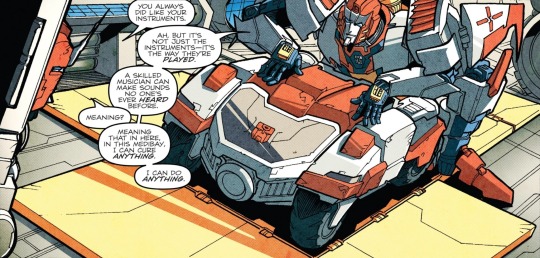
The ways in which Pharma exercises power and control are through his expertise, and his administrative/management skills. That’s it.
Self-confidence
Pharma’s arrogance and controlling tendencies don’t seem to be a mask—like he’s trying to compensate for some sense of lack (in those areas). Yes, he fears failure, and yes, he displays some insecurity when Ratchet questions his competence. But at every other point and in every other way, Pharma is unapologetically self-confident. He’s fully self-assured of his intellectual prowess and problem-solving capabilities; he knows what he knows, and he also knows what he doesn’t know.
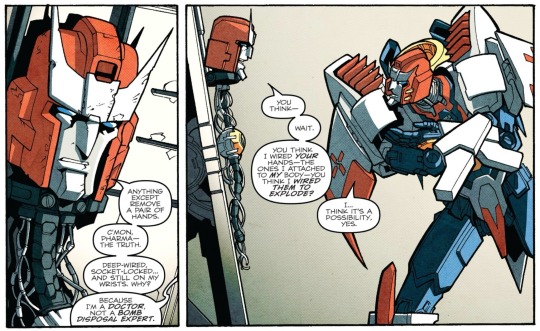
Pharma’s arrogance and desire for control don’t stem from a hidden lack of confidence or a hunger for power on its own. They stem from the fact that he genuinely sees himself as the best person for the work he does. He trusts himself above anyone else to solve problems that come his way—medical or otherwise (within limits).
Elitism vs. Superiority
I’ve always read Pharma as having an elitist attitude, but not in the social stratification sense:
elitist (adj.) relating to or supporting the view that a society or system should be led by an elite.
There’s no evidence that Pharma believes an elite class of people should hold the most power. Instead, Pharma’s “elitism” is actually an individualistic sense of superiority. It’s centered on him alone, and is tied to his capabilities as a physician scientist and surgeon.
Pharma sees himself as the best of the best and makes sure everyone knows it—sometimes through his words, but mostly by his conduct in the field of medicine. This, paired with Pharma’s natural temperament, doesn’t exactly make him socially popular—inside or outside of medicine:
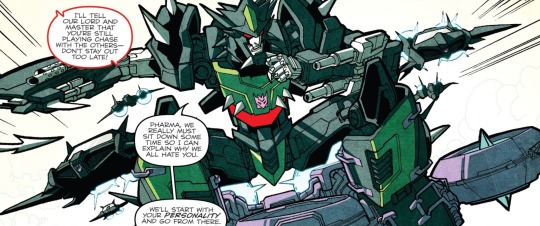
One could argue that the “personality” Lockdown is referring to was a result of all Pharma had suffered at Delphi and Luna 1, but just as easily, one could argue he was always a bit difficult to get along with, and that his traumatic experiences merely magnified his already-present psychological patterns. Personally, I like the latter interpretation because it’s a flaw that makes Pharma a more interesting character no matter his mental state.
Everyone reacts differently to real and perceived social rejection. Some are so concerned about it that they’ll try anything to belong; others genuinely don’t care, and they continue as usual; and still others cope by shifting their mindset and developing a sense of pride in being an outsider.
There’s no evidence for this in canon, but I believe it’s within reasonable characterization boundaries to headcanon Pharma as being in the second or third category.
With either of those two mindsets, a sense of superiority can develop, or even be an inciting factor. Either someone sees themselves as genuinely superior to the majority and doesn’t mind when this alienates them from people, or they convince themselves they’re superior because the pain of accepting they were rejected for who they are is too much to handle.
Whatever the case, the point is, having an “elitist” attitude isn’t necessarily rooted in a sociological or ideological belief. Sometimes, individuals just see something in themselves that—to them—justifies a sense of personal superiority. A quick glance at Pharma’s canon appearances makes it clear he holds such a view of himself, at least to some degree.
Morality and Compassion
When Pharma first shows up in canon, he’s working at the New Institute. A lot of questionable things took place there on a regular basis—things Pharma would have been aware of, to some degree. However, his presence at the Institute doesn’t automatically mean he agreed with everything happening. Depending on how strongly someone feels about something, some people are content to disagree in silence. Not everyone who seeks employment considers it a priority that the establishment they work for aligns perfectly with their moral values. After all, there are other reasons to take a job: financial benefits, exclusive educational and career opportunities, pure convenience, etc.
I’m not here to say either way whether Pharma’s willingness to turn a blind eye to the events at the New Institute was wrong or right; that’s up to each reader to decide for themselves. However, Pharma’s choice to remain employed at the Institute for some time can say something about him as a character: his priority as a doctor and person is not to take care of everyone he encounters, or to act as some kind of moral or ethical authority.
This isn’t to say Pharma won’t ever stand up for something he regards as right or push back against something he sees as wrong, “off screen.” It’s just that everything in canon points more to a tendency to choose his battles instead of acting immediately on any moral sense the way someone like Optimus or Ratchet might.
This also isn’t to say Pharma doesn’t care about saving lives, but from what little is shown of him before Delphi, it’s hard to say how much he cared. Ratchet confirms later that Pharma was an excellent doctor for most of his life, but all that tells us is he was an excellent doctor; it says nothing about his internal attitude toward his work or patients.
However, inferences can be made based on doctors in our own world:
Being a doctor—especially one in trauma care—is far from easy. It takes a lot out of a person, and there are very few people who last in the profession for a long time. Most medical professionals fall into one of the following categories:
People possessing a strong will that’s coupled with an unwavering passion for taking care of others (the public’s favorite)
People who naturally have, or develop, an ability to switch their empathy off and on at will, or build walls around it—also possessing a strong will (the ideal)
People who naturally have a limited capacity for empathy (the one the public hates to acknowledge)
People with a strong social and professional support system (the necessary, but underutilized and underappreciated factor)
Of course, even if a person has one or more of the above, burnout can and does still happen, but individuals who have at least one have the best chances of surviving and thriving amidst the demands of the majority of medical professions.
As far as is shown in canon, Pharma never had a strong support system—either circumstantially or by choice—so something else was keeping him in medicine.
Pharma shows concern for both Tumbler (Chromedome) and Hubcap:
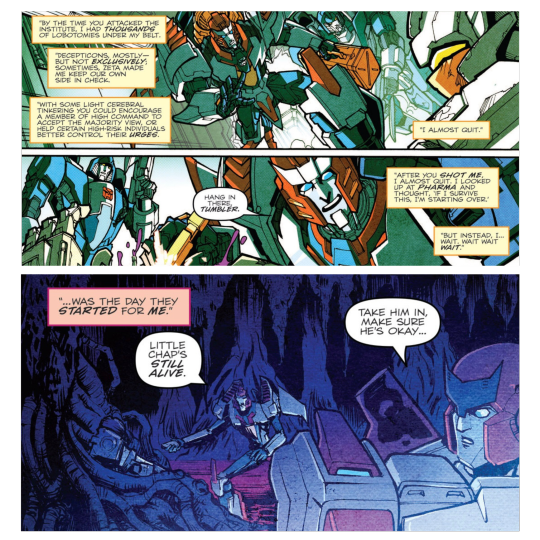
But even though he obviously cared enough to step in, neither instance makes a strong case for a capacity for empathy beyond the “average” or “norm.” Performing a job well is a lot different from being personally invested in the work.
Based on everything up to this point, and this later comment from Pharma, about Ratchet…
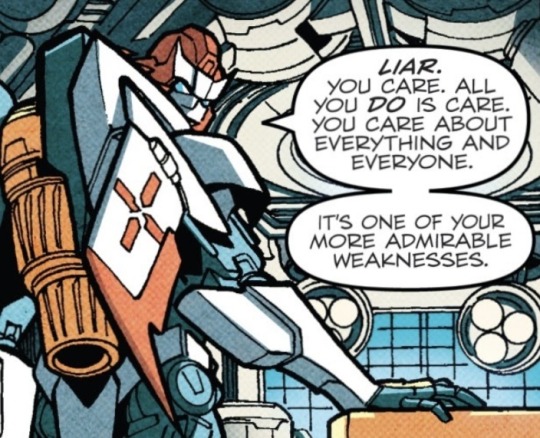
…Pharma has probably never shared the same I-care-about-everything-and-everyone view of the world. Instead, it’s more likely that Pharma holds a more rational view of his work and patients.
One of the first things learned in medicine, especially in trauma medicine, is that you can’t help or save everyone, and to hold yourself to that standard can destroy you quickly if you have a certain temperament or lack healthy boundaries for your empathy.
“There are times when it may seem as though I view sick or injured people not as living, breathing humans with feelings and emotions and people who love them, but simply as cases, as problems to be solved. And that is absolutely true. It's not that I don't have empathy, but the hard fact is that as a doctor, and especially as a trauma surgeon, too much empathy can get in the way of your job and cause you to make decisions based not on sound medical judgment but on your own emotions. Sure, I've seen things that even years later can still make me choke up when I think of them: a little girl shot and killed, a shattered young Marine who shouldn't have died but did. But you can't choke up in the ER or the operating room. To be effective as a trauma surgeon, you have to put a layer of Kevlar around your heart.” —Dr. Peter Rhee, Trauma Red: The Making of a Surgeon in War and in America’s Cities*
Pharma may have learned this difficult truth earlier than Ratchet and developed a practical way of managing his empathy that comes across as “cold.” He may have always had an ability to put up walls around his spark. Or, he may have always had little to no capacity for empathy.
The fact that the morality lock on Tyrest’s portal prevented Pharma from passing through proves he felt guilty for what he’d done, and JRO confirmed this. Therefore, it’s safe to assume Pharma had some level of empathy for his former patients, suffering moral injury when he felt he had no other option but to start killing them.
Still, looking at Pharma’s psychological drives and his behavior throughout canon, it’s clear compassionate care and morality are subordinate to his other values and interests.
*I highly recommend this book, and learning about Dr. Rhee in general. He’s a huge inspiration of mine, and one of my main sources of inspiration when writing Pharma. Level-headed and capable, strong-willed, selectively empathetic, an excellent scientist, etc. He lives for the thrill of practicing medicine both on the floor and as an expert in his field who pushes trauma medicine to new heights through his research. He also takes great pride in his hands. Seriously—the man spent an entire paragraph and a half talking about his “good hands” and how they were one of two reasons he decided to go into trauma surgery. The other reason was that he “liked action and excitement, liked the feeling of being able to walk into a tough situation and take control.” (Sounds familiar…)
Delphi
First thing’s first: we don’t know how much Pharma did or didn’t know about the DJD before agreeing to take the Delphi assignment.
That far into the war, he would have known something about the DJD and their ways of terrorizing traitors and Autobots, but for whatever reason, he took the assignment anyway. Perhaps Prowl assured him the situation on Messatine would be monitored and that the security team would be enough. Perhaps he underestimated the DJD’s capabilities, or scale of territory, and thought he would be able to handle things on his own. Perhaps Prowl gave him no choice. Maybe it was all of these and more.
Whatever the case, according to JRO, Pharma didn’t hate Delphi before the incident with the DJD.
Word of god remains a touchy subject in fandom, but in this case, it’s important because it says two things:
The DJD left the Delphi medical team alone for some time.
Being on the edges of DJD territory didn’t automatically mean isolation and harassment by their hand.
On the second point, First Aid was free to come and go from Messatine as he pleased, seeing as he attended a medical conference at Kimia five years into his assignment at Delphi:
Five years ago [mid-Delphi assignment], the leader of the Wreckers had cornered him at a medical conference at Kimia, the space station that doubled as a weapons research facility. —from Bullets
And five years after that, he was able to not only contact Springer without delay about one of Agent 113’s bullets he’d discovered in an Autobot badge…
He raced upstairs to his computer terminal and typed in a certain frequency code for the second time in his life. A face appeared on the screen and grinned. “It’s me,” said First Aid. “And you're never gonna guess what I’ve got for you..!”
…but he was also able to meet up with Springer to hand off the bullet:
“Your friend has a funny way of making contact,” First Aid had said when he’d got in touch three days earlier, and he was right.
It’s not known if this handoff happened on or off world, but either way, the DJD didn’t interfere.
At some point, Tarn set his sights on Pharma and the Delphi team. Knowing the DJD, one can only imagine what Tarn used to show off his team’s capabilities and convince Pharma the best option was to cooperate.
In striking a deal with Tarn to keep the DJD away from Delphi, Pharma established his territory and ensured his continued security and the safety of his staff. As long as Tarn got his T-cogs, Pharma could continue on in relative peace. He could work his magic on bots that ended up at Delphi, carry out his management duties, and work on whatever projects or research he may have been conducting in his free time.
For whatever reason, after he first came into contact with Tarn, Pharma didn’t call for help. Communications were still operational, as Pharma wouldn’t have suggested contacting High Command about the Duobots if the team was aware of any comm malfunctions:
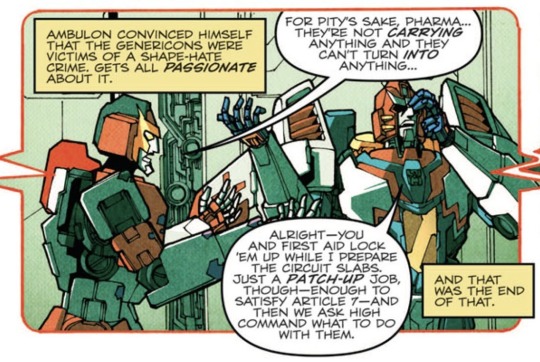
Also, First Aid later confirms that communications were fine until the Big Bang (soundbomb detonation):
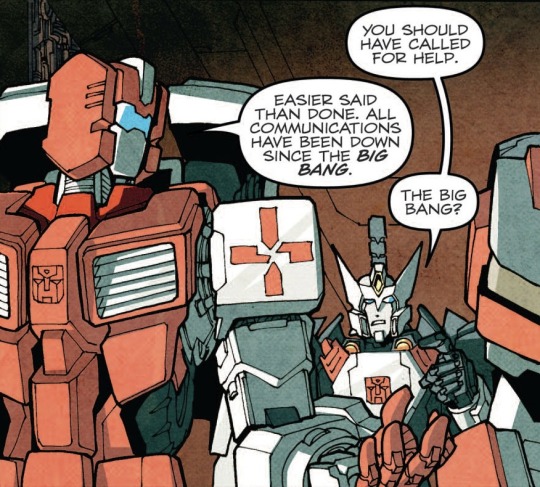
It’s always possible the DJD was monitoring the radio waves, but secure subspace frequencies exist, such as the Datalog Network First Aid used to send the datalog containing the death statistics:

Speaking of which, assuming First Aid sent the datalog with the statistics right when things started to get ‘weird,’ and before the Big Bang shut down comms, it only took—at most—a few days for them to reach Ratchet and Swerve on the Lost Light:

But back to Pharma not calling for help: for all of Prowl’s intel, contingency planning, and fretting over the security of Autobot territories, I find it hard to believe he would have stuck an Autobot medical team on the fringes of DJD territory without giving them some means of securely contacting the outside in case of issues.
But even if Prowl didn’t give Pharma a secure way to contact him or anyone else, and even if Pharma was convinced the DJD was monitoring regular communications, there were other ways he could have reached out for help. After all, the team wasn’t alone on Messatine. Like Pharma said, Prowl continued to send bots to defend the nucleon mines:
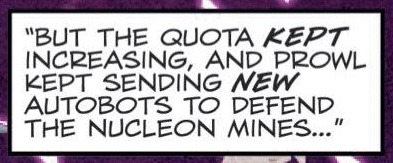
The Autobots had been mining nucleon for millions of years at this point, so I doubt the mined nucleon was just sitting in storage on Messatine; shipments of the stuff would have been sent off-world to wherever the Autobots needed it. Why not send a message for Prowl with someone leaving with one of those shipments? A message meant only to be sent over a call when absolutely certain they were out of range of the DJD’s potential monitoring.
Or, why not order in off-world medical supplies and send a message back with the delivery bot(s)?
There are two possible answers to this. One takes into account JRO’s word on the subject; the other is more intricate and speculative on my part, but it leads to the same place. So whatever your stance is on the validity of word of god, there’s an answer for you.
Answer one (word of god)
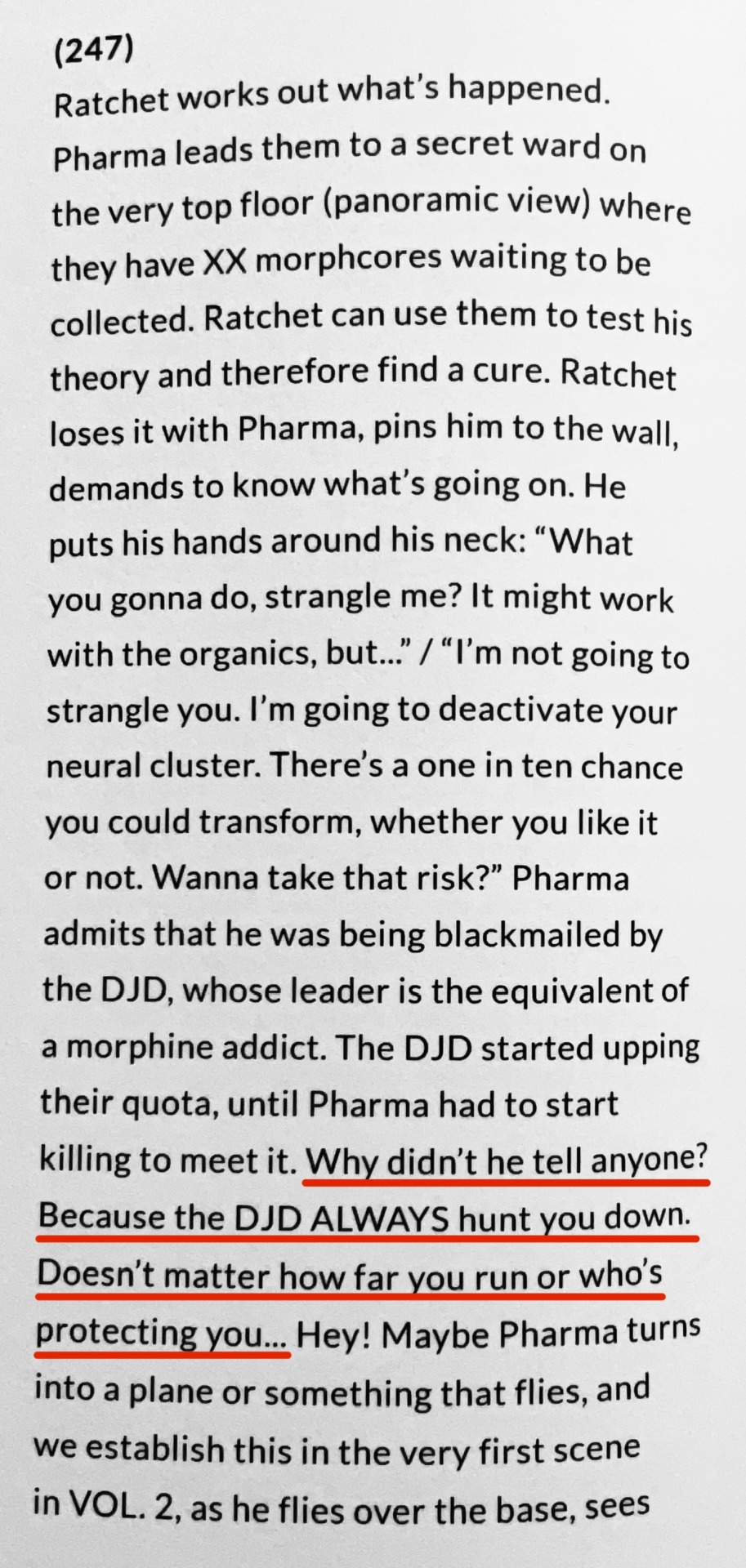
Simple as that. Pharma was aware of the scope of the DJD’s capabilities and relentlessness, and determined he was trapped prey.
Answer two (no word of god)
There are a few possible reasons Pharma didn’t call for help right away:
He was convinced all his other options would take too long and/or would still lead to him being put under suspicion. After all, being found to have harvested even a single T-cog from an already-dead patient for the DJD could have raised concerns that would lead to Pharma being investigated and/or having a mark put on his record.
He underestimated the severity of Tarn’s addiction, and was certain he could keep up with the T-cog demand without resorting to other means of harvesting, not realizing Tarn’s quota would increase later on.
He was already paranoid as a result of whatever mind games Tarn had set in motion at their first meeting, making Pharma think escape was futile.
Word of god or no word of god, there are clear reasons as to why Pharma ended up trapped. Most likely, it was a mix of all of the above.
Whatever was going on in Pharma’s mind before, he ended up in deeper trouble. Tarn increased his demand for T-cogs, and Pharma couldn’t keep up. By the time this happened, even if he had wanted to call for help, it was too late to do so without implicating himself. He reasoned his only option was to start killing patients to harvest their T-cogs.
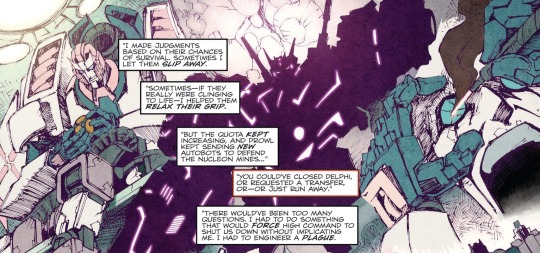
Soon, Pharma was so consumed with fretting over whether he’d be able to meet Tarn’s next demand that he didn’t have time or freedom to do anything else except worry and feel guilty. His whole life revolved around Tarn’s addiction; he was no longer in control, and could no longer enjoy whatever it was about Delphi he’d previously enjoyed. Perhaps the facility itself enabled Pharma to research cures and perform scientific miracles of medicine.
Being at the mercy of Tarn—convinced the DJD would find him no matter what—would have been pure psychological torture on its own, but also knowing that any small chance he did have of getting help would end in him losing everything would have added to his suffering. Pharma became desperate to reclaim control over his life and began planning an escape.
Now, JRO has said that Pharma didn’t originally plan to use the rust plague on the DJD…but canon says otherwise:

Of course, Pharma could have been lying to make himself look better in Ratchet’s view, but based on everything he’d been through up to this point with Tarn, it’s more likely he was telling the truth and had tried to eliminate the source of his suffering first. After all, wiping out the DJD would have been the simpler, cleaner option.
When the Duobots refused to detonate the soundbomb near the DJD, Pharma’s objectives shifted. He had to get Delphi shut down in a way that would:
Convince the DJD the shutdown was legitimate.
Pharma knew chances of escaping the DJD at all were slim to none, but he was desperate. Getting Delphi shut down would cut off Tarn’s supply of T-cogs and allow Pharma to escape Tarn’s immediate control, but the shutdown had to be “legitimate” to prevent Tarn from retaliating and hunting him down later. Leaving Tarn even the slightest chance of regaining control was too risky, so Pharma had to make sure his plan was as airtight as possible.
Cover up the patient murders.
If the truth got out about Pharma killing patients, he’d lose his medical license and most likely be put away for life. Being cut off from the practice of medicine and his intellectually stimulating work as a doctor would mean losing more than a job and a reputation. It would mean losing everything in which he’d anchored his sense of identity and life’s meaning. His refusal to consider any other options wasn’t just about ego and preserving his image as an excellent doctor; it was about preserving any kind of meaningful future he saw for himself.
Pharma needed a plan that would fulfill all of the above. Turning the engineered virus on the medical facility was the most effective and efficient solution. Anything else would have made him suspicious in the view of either Autobot High Command or the DJD, and neither of those would have ended well for him.
Because of his goal to preserve his reputation and future in medicine, he couldn’t even risk revealing anything to First Aid or Ambulon, who would have seen to his ruin. They became nothing more than loose ends that had to be tied up, and based on the fact that Pharma only prepared one vial of the vaccine, his original plan involved him being the only survivor:
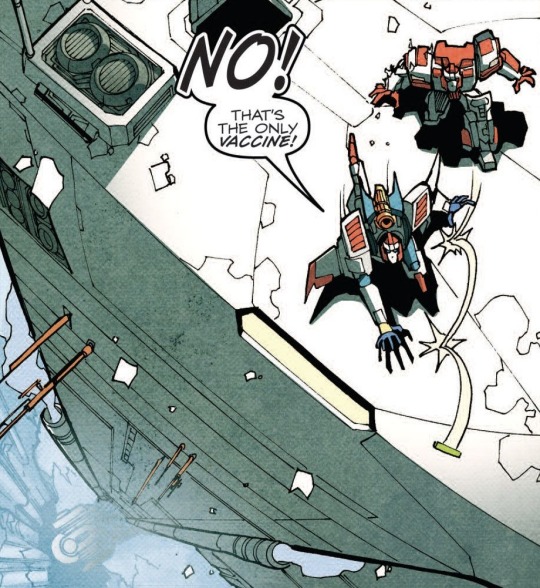
He probably would have had no problem making more of the vaccine for anyone else who survived, but he wasn’t counting on it. He wanted a totally clean slate; in letting his staff die with most of his patients, he would be getting rid of any and all evidence and reminders of his failures. He may have cared about First Aid and Ambulon before things got bad, but somewhere along the way, he decided either it wasn’t worth it to go through the trouble of finding a way to save them without raising suspicion, or he didn’t want to risk them putting together the pieces later on.
Of course, when Ratchet showed up, plans changed.
Ratchet
Ratchet is not the kind of person who seeks first to understand or be understanding. He’s inclined to trust what’s in front of him over anything abstract, and tends to look at the results of someone’s actions over trying to find any kind of ‘why’ behind them. Also, unlike Pharma, he operates from a strong moral sense, and reacts quickly and strongly when something or someone goes against that internal moral sense.
Ratchet’s reaction to finding out what Pharma did may seem hasty and harsh, but it makes perfect sense on a human level. There is no such thing as unconditional love; everyone has personal and moral lines (boundaries), and they’re different for each individual. When the most rigid of lines is crossed, that’s it; walls go up and the offender is cut off, no matter how strong the relationship may have been.
Ratchet obviously knew Pharma well enough to think he could try talking some sense into him, but then Pharma revealed that he’d crossed one of Ratchet’s lines: murdering patients. Any willingness Ratchet may have had to try to understand vanished. By the time Pharma started trying to provide a ‘why’ for his actions, Ratchet’s moral judgment had already shut down any chance of understanding what could have possibly led Pharma to kill patients. It didn’t help that Pharma seemed totally unapologetic and outright proud of his plan. For Ratchet, the ‘why’ didn’t matter anymore. What he saw was what he trusted, and what he saw was a friend who’d become his idea of a monster.
Now, Ratchet and Pharma’s relationship is one of the most confusing IDW relationships I’ve had the pleasure and pain of dissecting.
It is notoriously difficult to determine the depth and strength of a relationship from the outside. However, I’ve decided to go ahead and address it anyway because it has the potential to provide insight into Pharma as an individual.
If I were to sum up Pharma and Ratchet’s relationship in a single word, I would use “ambivalent.” The first time I read MTMTE, the thing that stood out to me most about their relationship was the drastic differences between how they each perceived the relationship.
In one sense, there’s the idea of Pharma basically being Ratchet’s crazy stalker ex, which is tossed around in fandom a lot. While I personally dislike seeing it regardless of context (yes, even as a joke), I do see how JRO’s writing choices set things up in a way that makes it easy to superimpose that trope.
In another sense, there’s the idea that Pharma and Ratchet were always close friends, and that what happened at the end of the Delphi story was a betrayal of both sides that came out of nowhere and whose consequences were taken too far.
I disagree with both. Personally, what I see at the end of the Delphi story isn’t an obsessed ex gone mad, a sudden betrayal, or a badly executed backstabbing. What I see is a breakdown of an already-complicated and poorly-maintained relationship: true feelings being revealed, long-repressed bitterness being forced to the surface, carefully-hidden cracks being split wide open.
Most people don’t have an accurate understanding of how much or how little they truly know the people in their lives, often overestimating how well they know a person until something surfaces and blindsides them.
According to JRO, Ratchet was oblivious to Pharma’s romantic interest, and throughout canon, it’s easy to see Pharma was more invested in the relationship than Ratchet ever was.
The question is, did Ratchet ever care about Pharma at all? And if so, to what degree?
Yes, Ratchet calls Pharma “buddy” and “friend,” but the former was sarcastic, and the latter means something different to each person. Also, in light of the circumstances, Ratchet could have just been saying “friend” in response to Pharma saying it—an emotional appeal more than anything.
However, Pharma must have been aware of Ratchet’s lack of relational investment because during the confrontation at Delphi, Pharma’s first reaction wasn’t to appeal to their friendship (ex: “But you know me!”). Instead, he appealed to their shared profession:
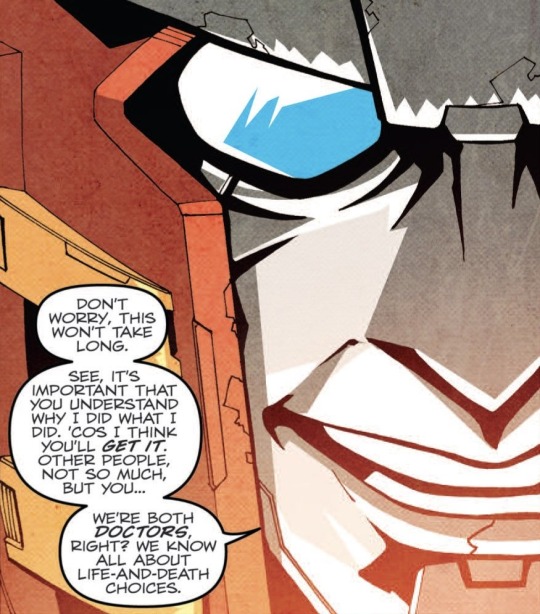
Then there’s the exchange of insults:
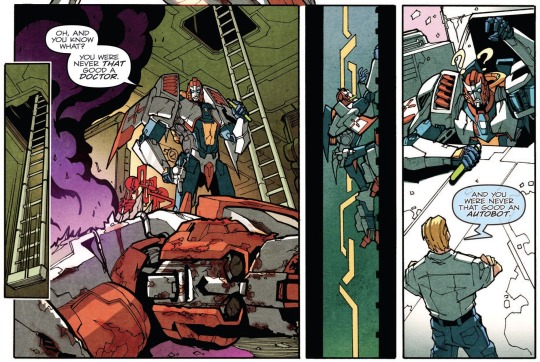
This is what I meant earlier by “true feelings being revealed.” Ratchet may have just been trying to match Pharma’s insult, but it’s unlikely it was merely reciprocal because while Ratchet is snarky at times, he’s sincere in that snark. There’s almost always some truth in his verbal jabs no matter how unserious they seem, and he’s never cruel for cruelty’s sake.
So, if Pharma saw Ratchet as an inferior doctor, and Ratchet saw Pharma as an inferior Autobot…it’s reasonable to assume there was always some deep-rooted competition and conflict preventing them from being super close.
Possible suspicion surrounding Pharma’s conduct as an Autobot paired with a tendency to misjudge the nuances of relationships could explain why Ratchet was so quick to decide Pharma was a lost cause. Maybe Pharma’s actions at Delphi confirmed something from the past that Ratchet had brushed off for whatever reason.
In any case, Ratchet seems to have been largely unaffected by the Pharma he found at Delphi. While leaving Messatine, he emphasizes that he’ll miss Pharma’s talent.

Not “who he used to be.”
Not “what we used to have.”
Just…“his talent.”
Later, on Luna 1, Pharma mentions that he and Ratchet were inseparable, but that could mean a few different things:
Best case scenario: Pharma and Ratchet sought each other out on equal terms.
Worst case scenario: Pharma followed Ratchet around.
Somewhere in the middle: the job forced Pharma and Ratchet to work in close proximity most of the time, and while Pharma intentionally ran into Ratchet more often than necessary, Ratchet also sought out Pharma every now and then.
Whatever the case, working with someone every day doesn’t tell you anything about who they are as a person, and the amount of time spent with someone doesn’t automatically correlate to how deep the relationship is or how well the people know each other. It’s not like either Pharma or Ratchet are shown to be good at expressing their personal feelings outside of extreme circumstances.
Ratchet does bring up late-night conversations of the past:

But while this indicates there was something deeper between him and Pharma, because neither of them were ever shown to be super open with their true feelings, it’s unlikely the conversations were full of touchy-feely talk. In all likelihood, the conversations were mostly medicine and war-related, with the rare spark-to-spark talk sprinkled in. Also, considering everything up to this point, one has to wonder if those talks ever meant anything to Ratchet, or if he was just digging for something that might stall Pharma’s torture.
Maybe those late-night conversations did mean something to Ratchet, but whatever the case, Pharma didn’t take the bait. He knew Ratchet was trying to stall by making an emotional appeal, and perhaps he was convinced the conversations hadn’t meant that much to Ratchet.
Looking at all of this, it’s hard to believe Ratchet ever cared about Pharma as more than an interesting work friend. But even if he had cared more than he let on, it wasn’t enough to overcome the doubts he had about Pharma’s character.
As for whether Pharma truly cared about Ratchet, I’m convinced he did, but in a mostly unhealthy way, and with a strong undercurrent of one-sided rivalry. At some point, Ratchet had been an equal and a source of challenge, and he probably listened to Pharma pretty often. It’s reasonable to assume Ratchet was one of the only people—if not the only person—able to handle Pharma’s intense temperament and challenge him in a meaningful way, providing some semblance of friendship for Pharma.
However, one last thing that stands out is that, when telling Ratchet why he’s torturing him, Pharma didn’t say anything like, “Because you hurt me” or “Because you turned against me—your friend.” Instead, he said it was for “ruining things at Delphi” and because “you declared war on my body.”
Either Pharma wasn’t being entirely honest, or Ratchet’s friendship didn’t mean as much in the first place as he’d previously implied. It’s possible the ‘Because you hurt me’ was implied in “for ruining things back at Delphi,” but why not say it outright? Perhaps it was a fear of vulnerability and admitting there was ever a relational need at all.
At the end of the day, it’s difficult to say for certain how close Pharma and Ratchet were, but it’s clear they were never on the same page and there were always barriers between them.
Luna 1
Revisiting the matter of Pharma’s morality taking a backseat to other priorities, his time on Luna 1 further underscores this. Again, Pharma chooses his battles and is unwilling to put himself at great risk for the sake of others, but a closer look at the situation with Tyrest reveals there wasn’t really anything he could have done for the Cold Construct population even if he had wanted to. It would have been him against Tyrest, an army of Legislators, and a bunch of Decepticons. Pharma knew his limits, and seeing as his goal was self-preservation, it was perfectly rational for him to go along with Tyrest’s grand scheme.
Besides, it doesn’t look like he was given much of a choice:

Although, knowing Pharma, he still would have demanded to know beforehand what he would get in return for the pain, and evidently, Tyrest held up his end of the deal since Pharma had access to the Luna 1 tech collection.
As for Tyrest’s plan to wipe out the Cold Construct population, there’s nothing indicating Pharma’s decision to turn a blind eye to it was rooted in malevolence or bigotry—just rational apathy: ‘I can’t stop Tyrest, so why concern myself with the outcome?’
Again, you can’t save everyone; Pharma had all he could do to save himself.
But it wasn’t all horrible. I would even go so far as to say Pharma found some happiness on Luna 1. Tyrest didn’t care about him, but he didn’t need Tyrest to care. Everyone else there hated him, but he didn’t need to feel like he belonged or was admired. At this point, Pharma’s only interest was Tyrest’s Luna 1 tech collection, and that meant playing nice so he could keep his reward. Back at Delphi, he probably assumed he’d never again practice medicine the way he’d loved; being brought to Luna 1 was an unexpected, yet welcome, second chance.
Even so, Pharma had his moments of cruelty. Back at Delphi, he had easily-identifiable reasons to kill patients—both the ones whose T-cogs he harvested and the 20 more he tried to kill when he shot the life support machine. But on Luna 1, he had no reason to be cruel, yet he chose to be. By this point, he’d mastered the ability to almost completely ignore or subdue his conscience.
In the case of Ratchet’s torment, one could argue Pharma only drew it out for retaliation purposes; it was personal for him.

As for cutting Ambulon in half, it was obviously meant to be as gruesome as possible, yet also quick. But personally, I don’t think it was about Ambulon; it was more about hurting Ratchet. Due to the fact that Ratchet’s identity is wrapped up in his compassion and his ability to be helpful as a doctor, one of the most effective acts of revenge would be to do something that makes him feel utterly helpless.
Also I wonder if, subconsciously or consciously, Pharma was attempting to recreate the sense of helplessness he felt back at Delphi under Tarn’s watch: “Do you see, Ratchet? Do you now understand how it feels to have control ripped out of your hands? To be totally helpless?”
Next, for some reason, Pharma was invested in the promised execution of Getaway and Skids:

He had no personal connection to either of them that would give him a reason to be interested, so maybe Tyrest told him he could perform the execution and/or have the corpses for medical experimentation. Either way, Pharma would have had a chance to use some of the tech in Tyrest’s tech collection, possibly explaining his excitement.
Of course, any chance of an execution disappeared when the final showdown went wrong.
When Pharma tried to escape to Cyberutopia and discovered he couldn’t pass through the spacebridge forcefield, he gave up. He’d been caught; he would no longer have access to Tyrest’s tech collection; Ratchet and every other self-righteous Autobot would never forgive him; and the morality lock prevented him from escaping. By all appearances, he would never again be able to engage in that which gave him a sense of meaning. He had shrunken his world down to his obsessive interest in a specialized field and one significant, yet unrequited relationship. With both of these lost, his world collapsed.
Yes, guilt played a part in Pharma’s despondency, but because he seems to have been in denial of said guilt, it’s more likely his despair was primarily due to the fact that he saw no future for himself. He had nothing left to live for.
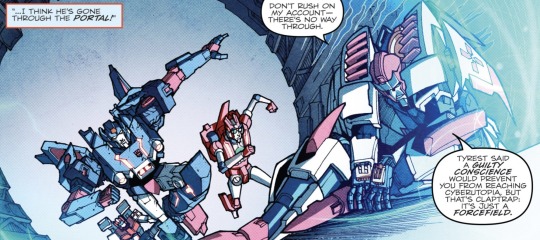
In light of this, Pharma’s flippant comments to First Aid make sense. He wasn’t being insensitive as much as he was goading First Aid. Pharma’s not stupid. First Aid had a massive rotary cannon on him, and Pharma knew exactly which emotional buttons to push to get him to pull the trigger.
Pharma wanted to die.
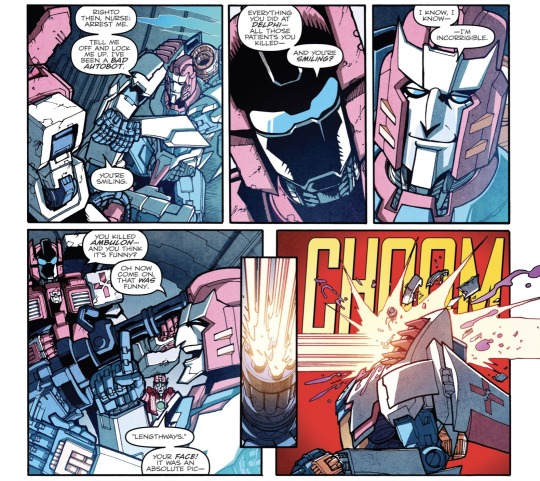
Adaptus
First, let me emphasize that Adaptus did not take possession of Pharma’s body. Instead, Pharma was the unwelcome guest:
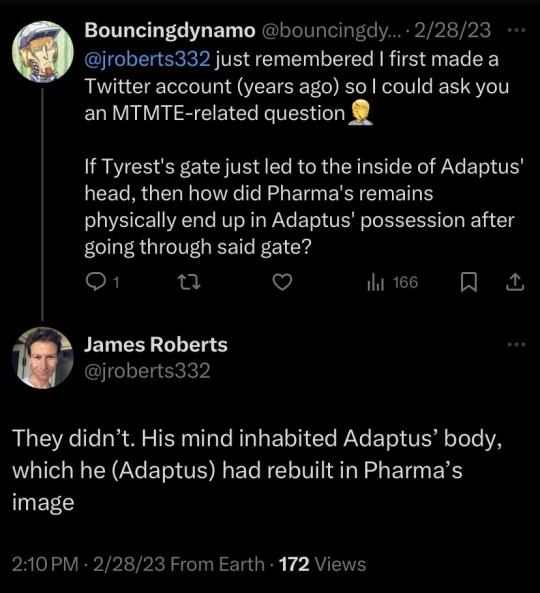
How Pharma ended up in Adaptus’ new body is a mystery, but whatever the case, Pharma didn’t pass on to the Allspark. Whether or not he had a choice can only be speculated.
First Aid had blasted Pharma’s head clean off, so whatever happened must have been related to the spark. Perhaps some residual spark energy was trapped in a body part that Adaptus repurposed, leaving Pharma tethered to the new body unwillingly.
Still, Pharma managed to assert his will and override Adaptus for a brief moment. Considering Adaptus was basically a god, this is impressive.
Based on Adaptus’ surprise at being interrupted, it seems he didn’t know Pharma was there. Why Pharma hadn’t tried to assert himself sooner is a mystery. Maybe Adaptus’ scheme was entertaining; maybe Pharma actually liked the company; or maybe he’d been waiting for an opportunity to get revenge on Tyrest for everything done to him back at Luna 1.
Sure enough, just like with Ratchet back on Luna 1, Pharma’s vengeful streak came out as soon as there was an opportunity.
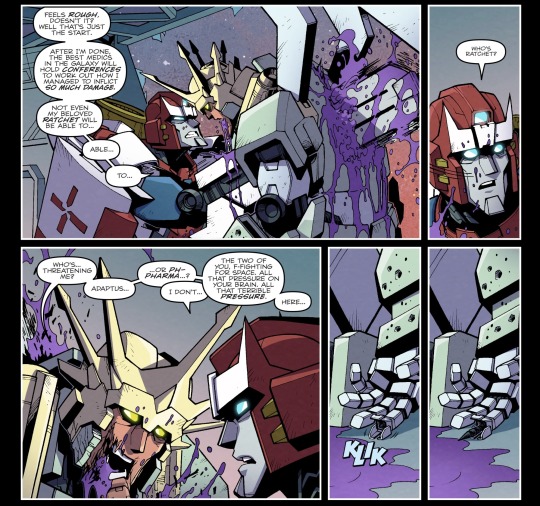
Unfortunately for him, this left him vulnerable, and Tyrest took advantage of the confusion:
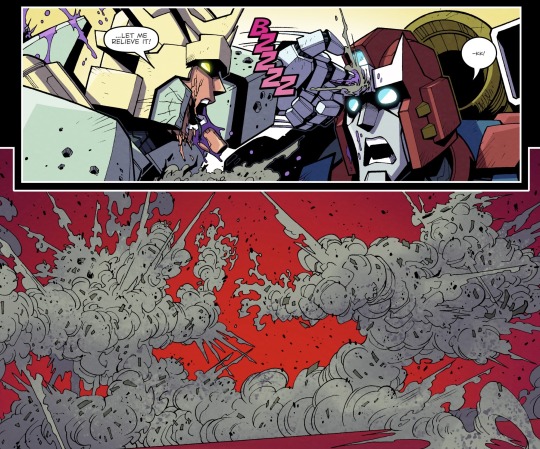
Conclusion
When someone reduces their world to narrow personal interests and one or a few very special people, their grip tightens around what little they have. They often become obsessive and possessive of the few things that make them feel alive, and their view of the world becomes increasingly more subjective and detached from the outside world. Pharma seems to have fallen into this trap.
Even so, in the context of the circumstances, several of the decisions he made were rational—even if coldly so. Oftentimes, “extreme” rationality and self-preservation are villainized in fiction, and characters like Pharma who don’t automatically put themselves at great risk for anyone and everyone are villainized, or at least looked down on. Their choices are often regarded as less human, but rationality and self-preservation are just as human as compassion and self-sacrifice.
Ultimately, Pharma was trapped and pushed over the edge into “insanity” by Tarn’s cruelty, but his own choices made from a place of pride determined how he fell, and how far he fell. It was a perfect storm of Tarn’s mind games and Pharma’s intellectual arrogance, excessive self-confidence, obsessive nature, and stubborn grip on the kind of future he wanted for himself.
Pharma is yet another Icarus who flew too close to the sun and paid dearly for it, and while JRO/the narrative could have given this Icarus better wings, that doesn’t change the fact that he chose to fly so high.
***
Many thanks to anyone who made it to the end of this monster of a post.
-tosses a Rodimus Star at you-
#idw transformers#idw1#maccadam#MTMTE#lost light#idw pharma#pharma#tf idw character analysis#tf idw meta#dr. fancy hands#nova’s nerding out again
730 notes
·
View notes
Text
Ἀπόλλων Φοῖβος, Θεὸς τοῦ Ἡλίου
Apollon, Bright One, God of the Sun
He is associated with Sunlight and the Sun, Music and Poetry, Prophecy and Oracles, Healing and Medicine, Plague and Disease, Archery, Knowledge and Wisdom, Purification and Cleansing, Order and Civilization, Protection of Herds and Flocks, Seafarers, Masculine Beauty, Music Theory and Harmony, Time and Seasons.
His symbols are the Lyre, Bows and Arrows, the Laurel Wreath, Ravens, Serpents, the Sun/Chariot of the Sun, Palm Trees, Bay/Laurel Trees, Wolves, Cypress Trees, Tripod, Lyric Poetry Scrolls, Golden Hair and Swans.
Major Sanctuaries and Temples
Delphi was the most famous sanctuary of Apollon, home to the Oracle of Delphi and the Pythian Games.
Delos was Apollon’s birthplace and celebrated Him with grand festivals like the Delia.
Didyma was known for its oracle and the Temple of Apollon, featuring massive columns.
Claros was another major oracle site, with its temple and priesthood.
Thermopylae was sacred to Apollon during the Amphictyonic League meetings.
Bassae was home to the Temple of Apollon Epikourios, renowned for its architectural innovation.
Aegina featured a Doric temple dedicated to Apollon.
Patara was an ancient Lycian city with ties to Apollon and prophecy.
Miletus’ citizens worshipped Apollon as their protector.
Rhodes revered Apollon as part of the island’s patron deities.
Athens worshipped Apollon in several roles, including Apollo Patroos (Protector of Families).
Sparta honoured Apollon as a god of order and harmony.
In Rome, Imperātor Gāius Iūlius Caesar Augustus constructed the Temple of Apollo Palatinus, aligning Apollo with imperial propaganda.
Mt. Parnassus, near Delphi, was regarded as sacred to Apollon and the Muses.
The island of Crete celebrated Apollon in various cities, such as Gortyna and Dreros.
General Epithets
Apollon (Bright, Radiant), associated with His solar and light-bearing qualities.
Delphinios (Of Delphi), linked to His sanctuary and oracle at Delphi.
Mousagetēs (Leader of Muses), celebrating His patronage of the arts and inspiration.
Loxias (Oblique, Mysterious), reflecting His cryptic oracular messages.
Pythios (Of Pythia), commemorating His victory over Python at Delphi.
Alexikakos (Averter of Evil), worshipped as a protector from harm and calamity.
Medicus (Healer), honouring His medical and healing powers, especially in Roman worship.
Catharsius (Purifier), invoked in cleansing rituals.
Smintheus (Mouse God), protector from plague and agricultural pests.
Lykeios (Wolf God), linked to His protective and wild nature.
Nomios (Pastoral), celebrating His guardianship over herds and flocks.
Karneios (Of Flocks), worshipped in rural Spartan traditions as a regional variation of Nomios.
Helios (Sun God), representing His solar connections in later traditions.
Agyieus (Of the Streets), protector of pathways and travelers.
Delios (Of Delos), celebrating His birthplace.
Didymaeus (Of Didyma), connected to His oracle in Ionia.
Festivals
The Pythian Games were held every four years at Delphi, including musical and athletic competitions in Apollon's honour.
Thargelia was an Athenian festival honoring Apollon and Artemis, featuring purification rituals and offerings of first fruits.
Delia, on Delos, was a festival that included musical contests, dances, and sacrifices sacred to Apollon.
Worship Practices
Sacrifices were often of animals such as bulls and goats, symbolic of his divine strength.
Prophecy played a central role in his worship, with priestesses and the Oracle at Delphi channeling his divine wisdom.
Apollon was invoked in rituals of cleansing and renewal, often symbolized by water.
Roman Veneration
Apollo Medicus was venerated as a god of healing during plagues.
Imperātor Gāius Iūlius Caesar Augustus claimed Apollo as his divine patron, constructing the Temple of Apollo on the Palatine Hill of Rome.
Altars and Sacred Spaces
Altars dedicated to Apollon are typically adorned with symbols like the lyre, laurel leaves, sun motifs and representations of His sacred animals (e.g., swans, wolves, or ravens), often altars placed in sunlit areas to honor His solar aspects.
Altars are frequently decorated with golden or yellow fabrics, sun-shaped decorations, and natural materials like wood or stone are common.
Offerings
Traditional Offerings are laurel leaves, honey, olives, figs, and wine.
Music, poetry, and other creative expressions are also considered as offerings due to Apollon's role as a patron of the arts.
Frankincense and bay laurel oil are burned, while crystals like sunstone and pyrite are used to symbolize His solar and abundant aspects.
Rituals and Practices
Devotees skilled in the arts often recite prayers or compose hymns in His honor, often inspired by ancient texts, while others prefer to stay with the ancient texts themselves. Both choices are equally valid.
Practices like meditating on Apollon's attributes or using divination tools to seek His guidance are common.
The creation of or recitation of music and poetry are also acts of worship. From humming a tune to singing along to your favourite songs, it counts as an offering and is just as valid.
Apollon's teachings on balance and enlightenment inspire personal growth and artistic pursuits, often being blended with the pursuit of philosophical and sometimes even spiritual enlightenment.
Rituals for spiritual or physical healing often invoke Apollon's aid, emphasizing His role as a healer.
Devotees seek His guidance in intellectual and intuitive endeavors, reflecting His association with wisdom and oracles.
Seasonal Celebrations:
Some practitioners observe festivals inspired by ancient traditions, such as the Thargelia or Delia, adapting them to modern contexts. I have yet to find a universally agreed upon date, but April 6th or the Spring Equinox are common due to Apollon's purifying and cleansing epithets, as well as His light and solar epithets.
Personal Notes
Apollon is a deity who only very recently called to me, which is amusing to me since I would have been under His protection. It speaks to me of His integrity that rather than reach out to me then, He has waited nearly seventeen years to do so. I think that perhaps is to do with two things which actually blend hand in hand; the first being that I have a strong suspicion that when He reached out to me, it was not as His Greek self nor even His Roman self; rather, it was as Paean (𐀞𐀊𐀺𐀚, Pajawone) that He reached out.
While I try to keep the history out of the religion in these posts, I feel it is best to explain fully in the case of Hellenic deities whose Mycenaean forms call to me most (of which there is a surprising number). Apollon, as Paean, is chiefly a god of medicine and healing. However, in Troy he was a god of hunting and protection, defending the early Trojans from the beasts of the forest. It is this Trojan Apollon, whom they called Paeiōn (𐀞𐀊𐀩𐀍, Pajerone) that called to me and is still known to this day as Apollon Lykeios. For those wondering why the names changed so much, the evolution from Pajerone to Apollon is due to the language changing and evolving during the Greek Dark Ages; the earliest known midway point is Apeljōn, so the linguistic evolution would be Pajerone -> Apeljōn -> Apollon.
With the mini history lesson out of the way, apologies for boring any of you, now to explain the significance of Pajerone/Apollon Lykeios as main epithet I worship. The Wolf God, Apollon Lykeios, is very different from the other representations of Apollon and is quite, shall we say, wild by comparison. He is still a healer, still knowledgeable in philosophy and music, but He is much more akin to His Sister Artemis and Her preference of the forest and the hunt. He is the Wolf, the hunter who struck down the Python and gained prophetic insight, the friend of Hyperborea whose bow can bring any prey low. To me, as Lykeios, he is still a God of Light, but his light is not simply the gold of the sun. It is the green of the field, the red and pink of blood on his skin. It is the purple of his robe and the blue of his eyes, dancing in the sky as the Aurora Borealis. He is the light that dances with the moon and stars, the Hunter who no prey escapes, the Wanderer who heals all with his herbs.
While far from the first Hellenic deity to call to me, He is perhaps the most important one for bridging the gap between the two main pantheons I worship, an ancient link between the northern hunters and the cradle of the West. It is through this link, through His wandering path from Hellas and Hyperborea all the way to Middungeard and beyond, that I can best reconcile worshipping two pantheons without Syncretism. He is a bridge between worlds, a fierce protector and a noble friend to all.
Orphic Hymn to Apollon
Blest Pæan, come, propitious to my pray'r,
illustrious pow'r, whom Memphian tribes revere,
Slayer of Tityus, and the God of health,
Lycorian Phœbus, fruitful source of wealth.
Spermatic, golden-lyr'd, the field from thee
receives it's constant, rich fertility.
Titanic, Grunian, Smynthian, thee I sing,
Python-destroying, hallow'd,
Delphian king:
Rural, light-bearer, and the Muse's head,
noble and lovely, arm'd with arrows dread:
Far-darting, Bacchian, two-fold, and divine,
pow'r far diffused, and course oblique is thine.
O, Delian king, whose light-producing eye views all within,
and all beneath the sky:
Whose locks are gold, whose oracles are sure,
who, omens good reveal'st, and precepts pure:
Hear me entreating for the human kind, hear,
and be present with benignant mind;
For thou survey'st this boundless æther all,
and ev'ry part of this terrestrial ball
Abundant, blessed; and thy piercing sight,
extends beneath the gloomy, silent night;
Beyond the darkness, starry-ey'd, profound,
the stable roots, deep fix'd by thee are found.
The world's wide bounds, all-flourishing are thine,
thyself all the source and end divine:
'Tis thine all Nature's music to inspire, with various-sounding, harmonising lyre;
Now the last string thou tun'ft to sweet accord,
divinely warbling now the highest chord;
Th' immortal golden lyre, now touch'd by thee,
responsive yields a Dorian melody.
All Nature's tribes to thee their diff'rence owe,
and changing seasons from thy music flow
Hence, mix'd by thee in equal parts, advance
Summer and Winter in alternate dance;
This claims the highest, that the lowest string,
the Dorian measure tunes the lovely spring.
Hence by mankind, Pan-royal, two-horn'd nam'd,
emitting whistling winds thro' Syrinx fam'd;
Since to thy care, the figur'd seal's consign'd,
which stamps the world with forms of ev'ry kind.
Hear me, blest pow'r, and in these rites rejoice,
and save thy mystics with a suppliant voice.










#hellenic deities#hellenic pagan#hellenism#hellenic polytheism#hellenic worship#hellenic gods#helpol#hellenic polythiest#greek gods#greek mythology#apollo
194 notes
·
View notes
Text
Tarnma fic but it's based around Tarn writing fanfiction for a "dead" fandom and Pharma reading fanfiction (long story, blame First Aid)
#tarnma#silly#tarn#pharma#really I see this in a G1-ified version of idwg1 like we've played with in the past#with bounty hunter!Tarn and the Delphi medics being grouped with the others on Earth#but I'm leaving options open here#transformers#maccadam#sorry🥺 I just think in universe fandom is such an idea#first aid#Tarn has the brainworms and plot bunnies over a pre-war series older than he is😌
42 notes
·
View notes